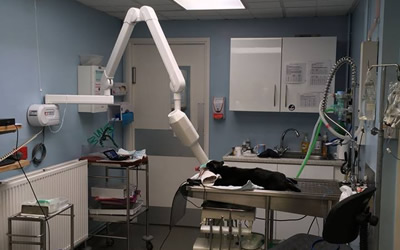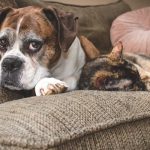The Importance of Dentistry
Dentistry in your pets
 Here at Prospect House, we are always looking at ways to improve the care of our patients. We all know that x-rays have been an important part of human dentistry for a long time and we are now appreciating the benefits of dental x-rays for our veterinary patients.
Here at Prospect House, we are always looking at ways to improve the care of our patients. We all know that x-rays have been an important part of human dentistry for a long time and we are now appreciating the benefits of dental x-rays for our veterinary patients.
Studies have shown that almost half of cats and a third of dogs have hidden dental disease which can only be detected by x-ray. We have recently invested in our own dental x-ray system, meaning patients at Prospect House can be given the best possible treatment.
DENTAL CARE IS AS IMPORTANT FOR OUR PETS AS IT IS TO US
All our pets will get some degree of dental disease unless the teeth are regularly brushed. A frightening statistic states that 80% of dogs and cats over the age of three need dental treatment.
Many owners are unaware of these lurking problems as the mouth can be very difficult to examine.
Dental disease in our pets is a health and welfare issue and it can trigger other serious health problems if left untreated. Toothache and pain may go unnoticed as animals carry on eating.
Inflamed gums and periodontal disease can lead to bacteria spreading via the bloodstream to kidneys, lungs and even heart valves all contributing to chronic ill health.
When we examine the mouth we are looking for signs such as recession and bleeding of the gums, bad breath, loose or cracked teeth, build up of tartar, pockets around the teeth, swelling of the gum or face and fur staining from drooling.
We strongly recommend DENTAL X-RAYS routinely for cats and as appropriate for dogs.
The tooth is like an iceberg, with most of the tooth being under the gum. Dental x-rays allow us to see the entire tooth. This is particularly important in cats who may develop HOLES or ‘Feline Resorption Lesions ’in the teeth below the gum line.
This can mean that despite the tooth being visible in the mouth, the root may have disappeared. Without an x-ray, the operator may spend time and effort trying to remove a root that has been resorbed. Dental x-rays in these circumstances will therefore reduce the dental time and will reduce trauma in the oral cavity.
Dental radiography allows for treatment planning and visualisation of any ‘periodontitis’ (the degree of inflammation in the tooth socket). It can also provide important information after tooth extraction on whether the entire root has been removed and whether missing teeth are truly missing or still in the jaw bone.
We feel strongly that although we must charge a fee for the radiography, by giving us a much better picture of what is happening in the mouth, there will be a better long term outcome following dental treatment.
We have a range of fees for dental procedures based on the time taken to complete the treatment. A scale and polish procedure would be quicker than a dental involving multiple difficult extractions. There is also a fee for the general anaesthetic, any postoperative medications and an extra fee for any necessary radiology. Pre-anaesthetic blood testing may be advisable and we would discuss this on a case by case basis.
Following the procedure we will discuss ongoing preventive care, including brushing, plaque reduction products, special diets and dental chews.
Book a free dental check TODAY and we can advise you on the best way to protect or treat your animal to stop serious dental disease.





